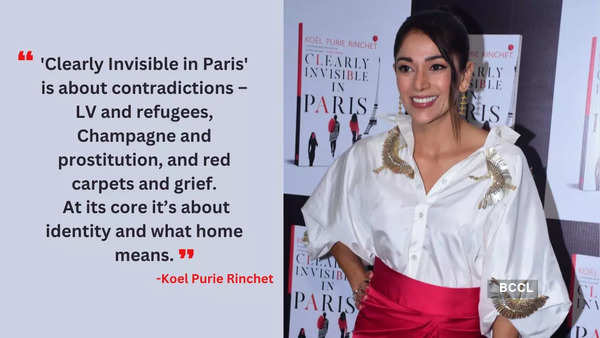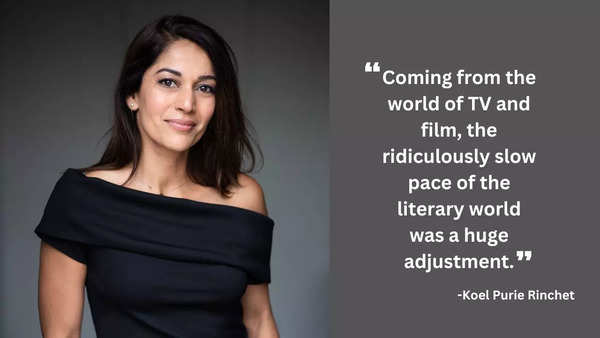All characters in my book are flawed: Actress-producer Koel Purie Rinchet on writing ‘Clearly Invisible in Paris’ – Times of India
1. From being an actress and a producer, you have now turned into an author. As a debut author, what were the challenges you faced while writing this novel and how did you overcome them?
Time was a big challenge. I had other creative commitments and projects, plus a young child. After the customary morning procrastination just as I’d get into the flow of writing, it was time to pick up my daughter from school, or the dog would need walking. I’m lucky though that the flow always came and the story kept giving, even when I had no clear idea of where I was going. It kept unfolding as if I was experiencing it.
2. Could you tell us about a moment that made you feel ‘clearly invisible in Paris’, which in turn inspired the book?
The idea of outsiders in the ‘city of aloof’ started forming quite organically after about a year of living in Paris, which is more than four years ago now. But I only put pen to paper post the pandemic. The book is a piece of fiction because nothing trumps the power of imagination for me. Of course, the seed is an amalgamation of real people, current and past events, something I read about, something that happened but then I reimagine and invent. Once I had the characters in place, they were raring to tell their own story and the narrative took a life of its own. I would read my words from the night before and have to rewrite bits because it had too much of Koël’s voice. So, I’d immerse myself in the character, like I would when preparing for a role, and then I could hear what they’d sound like or what they’d do in that moment.

3. Tell us a bit about your book– how long did it take you to write it, how did you come up with the title?
The novel centres around four disparate outsiders trying to fit into a city that’s determined to keep them at arm’s length and the unlikely friendships that see them through. It’s about contradictions – LV and refugees, Champagne and prostitution, and red carpets and grief. At its core it’s about identity and what home means – who gets to be an expat and who an immigrant. All the characters in my book are flawed, broken people, who constantly make bad choices. I’m attracted to imperfection and you’ll find me eulogising that a lot in my novel. Though, I rarely offer resolutions, there is plenty of celebration, joy and hope in my story.
I wrote the first draft in about seven to eight months from first word to the end. As I fleshed out the story I fed it with intense research, plenty of imagination and a fair bit of immersive experience. My agent said it was “method writing”. Sometimes I’d imagine a situation or person and then find all the research to back it up or I’d read some piece of news and then twist it and build on it the way it suited my story and characters.
4. The story highlights the universal theme of female friendships… How much of it is inspired from your own life?
Through the ages my girlfriends have always held pride of place. I have so much respect and empathy for the women in my life and the lives they’ve lived. So, having women protagonists was conscious. But I also have quite a very strong male characters- flawed and beautiful, they may not take up a lot of space, but their presence is felt across the story. Friends who become chosen family see us, see our joys, our despair and make us feel visible which is all anyone ever needs – to be seen and heard.

5. As a debut author, are there any things you wish you knew before getting published?
Yes, how slow the literary world is. Coming from the world of TV and film, the ridiculously slow pace was a huge adjustment. It is, however, good for me to work on my patience. Breathe in, breathe out.
6. Do you plan to turn this into a play or for screen anytime soon?
Every story finds its own medium. The book is definitely very visual, and my flawed unapologetic characters would work wonders on screen. But when I put pen to paper, I needed ‘Clearly Invisible in Paris’ to be a novel first as I wanted to be in each character’s head and dive into their stream of consciousness.
7. Do you believe in the power of storytelling? Do you think fiction can change the world?
Yes, yes and yes. What you can impart through entertainment and emotion is far stronger than anything you will ever say standing on a podium. I love fiction; the power and freedom of imagination gets my creative juices flowing like nothing else.
8. What are you working on next?
My play ‘Mummy’s Dead, Long Live Mummy!’, that I wrote and performed in just finished a very successful India Tour.
I’m also developing William Dalrymple’s ‘Kohinoor’ for screen but that’s a slow and long process.
I’ve also started work on a fantastically chilling new idea for a mini-series that originates in the hardest parts of India and ends up in the aristocratic living rooms of Paris.
Next, I’ll be seen in Zoya’s ‘Archies’ and Rajat Kapoor’s ‘Everybody Loves Handa’.
Romance writer Emily Henry shares her relationship tips, the books that changed her life, and more
window.TimesApps = window.TimesApps || {}; var TimesApps = window.TimesApps; TimesApps.toiPlusEvents = function(config) { var isConfigAvailable = "toiplus_site_settings" in f && "isFBCampaignActive" in f.toiplus_site_settings && "isGoogleCampaignActive" in f.toiplus_site_settings; var isPrimeUser = window.isPrime; if (isConfigAvailable && !isPrimeUser) { loadGtagEvents(f.toiplus_site_settings.isGoogleCampaignActive); loadFBEvents(f.toiplus_site_settings.isFBCampaignActive); } else { var JarvisUrl="https://jarvis.indiatimes.com/v1/feeds/toi_plus/site_settings/643526e21443833f0c454615?db_env=published"; window.getFromClient(JarvisUrl, function(config){ if (config) { loadGtagEvents(config?.isGoogleCampaignActive); loadFBEvents(config?.isFBCampaignActive); } }) } }; })( window, document, 'script', );
For all the latest lifestyle News Click Here

